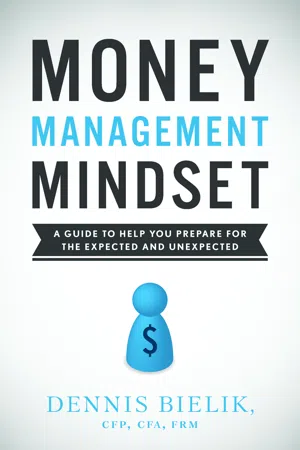![]()
PART 1
![]()
INTRODUCTION
Have you ever played the board game Life? As a player, you spin a wheel with numbers 1 through 10. The spinner determines how fast or slow you move through spaces that name common life activities—college, jobs, marriage, and children, for example. You may move quickly or slowly to the finish line, depending on where the spinner lands. When it comes to a first job, your salary is determined by choosing a card at random. Throughout the game, you can pick the type of house you want to buy, or you might land on a space with an unexpected event, good or bad. Unlike in real life, you encounter these occurrences in a set order, and you have no control over them. Some spaces benefit your life, while others set you back.
Like any board game, there are winners and losers. (You probably won’t win the first time you play.) But the great thing about it is that you can play more than once. You learn to strategize and improve your chances to win. Real life, of course, gives you only one chance. But we make our own choices about most of these events: Do we go to college? What type of career do we pursue? Do we get married, and do we have children? What kind of house do we purchase, or do we live in an apartment? Our decisions are important and can affect us throughout our lives.
Even more significantly, we can create a financial strategy that will help us manage not only expected milestones like marriage, children, and work but also those events that surprise us. We can learn ways to assess and regularly review what we need, want, and dream about so that our lives and those of our loved ones are as secure as we can make them.
That is my purpose with this book.
Helping people has long been a passion of mine, and it’s the basis of my work in the financial field, where I’ve been able to draw on my own life experiences. I grew up with hardworking parents who had jobs outside of the home. They both traveled for work to support our family but always put us kids first. As a teenager, I began to work and used to ask my parents about finances. They never had a financial advisor and were very risk averse. I was curious about this because there were plenty of television shows and movies about financial advisors and people seeking their help.
It wasn’t until I entered the financial services industry that I realized why my parents (and many other people) had never worked with anyone. They had undoubtedly heard of someone getting taken advantage of by a person claiming to be an advisor. Or perhaps they felt as though they didn’t have enough money to warrant one. Those realizations struck me hard. The people who need help the most are reluctant to ask for help. It’s been a passion of mine to address that paradox.
I was one of five boys, four of whom were born within seven years of each other and one of whom was adopted and raised as one of us. Our family experienced several tragic events: My oldest brother passed away, our house burned down, and one of my little brothers was diagnosed with a rare form of leukemia. It was more than you might expect in a single family, and it’s hard to plan for those kinds of events. It’s also difficult to think about finances when so much emotion is involved, but some sound financial advice would certainly have given my parents more peace of mind.
People always want to plan for positive goals, but in reality, a plan also needs to account for the risks associated with life. I know how hard it was to watch my parents go through these experiences. My goal is to help others plan for them.
The board game of Life is fun to play, and it can be a useful way of imagining how to navigate the choices, celebrations, disappointments, and surprises—the ups and down—we all face. In the following pages, we’ll follow a more realistic journey through the real “game” of Life—no spinners or sheer luck involved.
![]()
1
EVERYONE NEEDS A PLAN
In late 2007, I was at my parents’ house recovering from a severe auto accident. I had spent a week in intensive care and undergone a major surgery to address internal injuries, a concussion, and back and wrist injuries. I’d always been a planner and tried to plan for my future. I set goals for myself, from selecting my career to deciding how old I wanted to be when I married and had kids. But during those weeks of rest and healing, I came to realize life doesn’t always follow your plan.
My dad, a CPA, was considering retirement, and we talked a lot about his future while I stayed with him and my mom. He worked for the federal government his whole career. The only thing keeping him from retirement was funding my younger brothers’ college tuition. Luckily, my siblings were hardworking students and sped through their education. Looking ahead at retirement, my dad debated whether to keep his pension annuity or take a sizeable (and tempting) lump-sum payout.
When I looked closely at the pension, I saw it produced an 8 percent annuity. If he invested his payout in the stock market, he would need an 8 percent risk-free rate of return to provide the same benefit. My dad and I sat down to discuss this issue. He ended up taking the annuity. I asked him what made the decision so hard to figure out. He said he was more focused on having a legacy to pass down to us than securing his own financial freedom. The difficulty of this choice in the context of his values would stick with me as I became a financial advisor.
Throughout every individual’s life, decisions need to be made at key moments: Take a job? Get married? Go through a divorce? Retire? I call big moments like these “checkpoints.” They occur at any age and every stage in life. Though they may fall into familiar categories, the ultimate decisions about what to do are ours and ours alone. All checkpoints also can create financial stress.
Later in the book, we’ll examine these checkpoints in detail. For now, it’s important to understand that the way to reduce the stress of these major events is to have a plan—and to live it. Unfortunately, most people don’t have a plan. If they do have one—whether they created it by themselves or with the help of a planner—they tend to ignore it.
Most of us have one major goal: happiness for ourselves and our loved ones. Beyond that, however, everyone’s plan for achieving that goal will be unique—and should be. After all, your situation is undoubtedly different from mine.
Let me tell you about my plan. It’s not built around retirement or buying a dream home. My plan is built around having enough money so that I can work for passion and fun. I love what I do, but losing my job and not being able to support my family is still a big fear. It’s the outcome of my pillow test; in other words, it’s what keeps me up at night. That’s why it’s an important part of my plan.
If you lie down at night and cannot sleep because you’re concerned about something financial, that should be your priority as you create your own plan.
What exactly is a life plan? A financial plan focuses on retirement as the main objective. I use the term “life plan” to describe an evolved version of a financial plan. It should help you achieve more than just retirement. It should help you determine your insurance needs and create or amend an estate plan for your offspring and any charities. Every aspect of your life that involves money, from buying a home or car to making investments, should be addressed and adapted as goals change.
I’m not talking about “life planners,” who are basically motivational speakers. They may help you set goals and improve your outlook and habits day to day. But that’s different from having an overall financial plan that allows you to navigate through important periods of your life.
Often people use the term “life planning” to mean they assist clients with investment issues. For example, they’ll review your estate documents and ensure they are up to date. That is certainly a step in the right direction. But it doesn’t take into account the overall path of your life or plan for other decisions.
The real issue I have with many planners is they help you build a plan but don’t actively help you take charge of it throughout your life. As they see it, you are still responsible for living the plan and keeping yourself accountable. It is up to you to notify them with changes. You may have no idea what those changes are or why and when they may occur or should occur. These so-called life planners haven’t alerted you to checkpoints, nor have they given you the tools you need to deal with them effectively. As I said, it’s no good to build a plan if you’re unable to live it.
Moreover, if that plan is stagnant and doesn’t change as our life changes, it inevitably will become useless. Even estimates of when we’ll hit our checkpoints may change. Think of a long road trip. We can plot our journey on maps or on our phone and estimate the time it will take to arrive. Two things may happen: We’ll get there earlier or we’ll take longer than planned. Anything from a storm to a car wreck can slow us down. If we drive over the speed limit to get there faster, we risk getting stopped for speeding, delaying our arrival. Only rarely will we arrive at the exact time we expected to arrive. Life is the same way.
I’m not here to tell you if your decisions at different stages of your life are right or wrong. You don’t get graded on your life plan. It’s not a class; it’s your life. The moment you view it as a pass-or-fail test, you may become impatient. It may become less important to you, or you may make excuses for why you are behind. A plan is an adaptive and iterative process. You need to embrace it as such. That will allow you to change the plan when you fall behind or adjust it if you are ahead of where you thought you might be.
Think back to my parents’ situation. When our house burned down due to a freak accident, it set them back, but there was no point in giving up. It meant they had to adapt to get back on track for their goals. (Luckily, my parents had insurance that covered the fire. Everyone should have home or rental insurance.)
Creating a life plan is not a simple task. You can’t look at a board game and trust that college, marriage, children, or jobs will necessarily happen in the same order for you as for someone else. Meshing your goals with these checkpoints calls for research and the right tools. That’s why I encourage you to work with a planner who understands the possibilities and commits to staying the course with you, reevaluating your plan as necessary. No matter your wealth or stage in life, set out to find a planner you can trust. We all need some help, and the value is beyond simply helping you inve...

